Ecuador’s progressive presidential candidate Andrés Arauz narrowly lost the election last Sunday. But the left’s internal divisions were not the only problem, explains CodePink’s Leonardo Flores.
Transcript
Greg Wilpert
Welcome theAnalysis, I’m Greg Wilpert. Presidential elections took place in two Latin American countries last Sunday. While Ecuador held a runoff vote, Peru had a first round vote.
In this segment, we’ll take a closer look at the elections in Ecuador. There, Guillermo Lasso, a conservative banker and one of Ecuador’s richest individuals won the election with 52.4 percent of the vote. The result was a bit of a surprise because polls had given his opponent, the leftist economist Andrés Arauz, a narrow lead in the weeks before the vote. However, a third candidate, Yaku Pérez, who did not make the runoff and who ran for the Indigenous Party Pachakutik as an eco-socialist candidate, urged his followers to spoil the ballot in protest against both runoff candidates.
Joining me now to discuss the election result is Leonardo Flores. Leo is the Latin America campaign coordinator with the peace and human rights group Code Pink. He joins us from Quito, Ecuador, where he was an official election observer for the recent election. Thanks for joining me today, Leo.
Leonardo Flores
Thanks so much for the invitation, Greg.
Greg Wilpert
So let’s start with Sunday’s election itself. You were there to observe. What was the voting process like and were there any indications of fraud, as some people warned before the vote took place?
Leonardo Flores
The voting process was actually very smooth. It took voters maybe between one to two minutes, actually less to carry out the whole process, starting from presenting their IDs to actually voting and putting the ballot in the box and signing their name and putting the thumbprint. We saw lots of very high turnout throughout the day. I think turnout reached around 83 percent. I don’t know if that’s the final figure, but that’s the figure I saw late last night.
There were no irregularities at all that we witnessed. I mean, very small ones, but nothing to suggest systemic fraud. We’re pretty confident that the vote and the count itself were carried out in a free and fair manner.
Greg Wilpert
So as I said in my intro, the defeat of Arauz was a bit of a surprise, at least it was following the opinion polls before the election, and also, if you look at the electoral math, that is adding up Arauz’s votes from the first round and Yaku Pérez’s votes from the first round, they should have gotten over 50 percent if you add them up, but obviously it doesn’t always work out that way. Now, on the other hand, one could also say that it was almost a miracle that Arauz got so close to being elected, considering how he and his movement were treated by the media, by the electoral authorities and by the judicial system. Talk about the obstacles that Arauz faced in the lead-up to this election.
Yeah, I mean, well, yesterday itself was free and fair, the run up to the election was certainly not. I think Andrés Arauz was facing a very uneven playing field, and it goes back to and it starts really with media coverage here in Ecuador. The mainstream media is completely corporate and it was backing Lasso basically 100 percent. It was very difficult for the Arauz campaign to get airtime, certainly didn’t get anywhere close to equal airtime, and the problems go back much further, actually. So as we know in Ecuador, there’s been a massive campaign of lawfare against the left, particularly against what’s known as the Citizens Revolution, which is the movement behind Andrés Arauz.
For example, Andrés Arauz’s actual party was used to be called Alianza PAIS, the Country Alliance, and it was banned from participating in these elections. They tried to form a new party and they were again rejected by the electoral authorities. Eventually, they managed to run under UNES, Union for Hope because this was a party that already existed, and basically it offered the slot to Andrés Arauz. On top of that we saw kind of very arbitrary decisions by the electoral authorities.
Rafael Correa, the former president, president from 2007 to 2017, someone who brought economic stability and political stability to Ecuador, and really just we saw huge economic growth, redistribution of wealth, and a huge increase in spending in health care, infrastructure, education, everything that everyday citizens could hope for in a government. He was not allowed to run for the vice presidency.
Not only that, the Arauz campaign was forbidden from using his image, but just to give folks an idea of how unfair this was. The campaign was not allowed to use Correa’s image, but other campaigns were allowed to use Correa’s image in a negative way to attack Arauz.
So this sort of arbitrariness really harmed the Arauz campaign. Also, the campaign was only registered officially as a candidate back in December 2020, whereas other parties had a four or five month head start in terms of campaigning. So despite the fact that coming into this week, we were looking at a possible Arauz victory, given the polls, it’s not that surprising that he lost, given how the odds were stacked against him and his party, and in fact, I think the showing wasn’t so bad given everything that occurred right now.
Greg Wilpert
Another obstacle that Arauz faced, as I mentioned, was that Ecuador’s left went into this election very divided. So on the one hand, Andrés Arauz carried the banner of, as you mentioned, former President Rafael Correa and the Citizens Revolution, and on the other hand, there was Yaku Pérez, who is the leader of the Indigenous Party, Pachakutik, but he’s also a harsh critic of Correa, and also, of Arauz. Now Jaku Pérez narrowly missed the runoff vote when he got only a fraction of a percentage point less than Lasso in the first round, and they both got around 19.4 percent. So in theory, as I said, if all of Pérez’s voters had voted for Arauz in the second round, Arauz should have won, but Pérez urged his supporters to abstain by spoiling their ballots and spoiled ballots according to the figures I saw just recently, made up about 16 percent of the votes cast.
And then, as you mentioned, abstention was another 17 percent. So you could say that participation was only 68 percent if you add that up together. Now, why do you think that Pérez called for abstention? I mean, what was the point here?
Leonardo Flores
Right, so it gets a little complicated, right? So Pachakutik and UNES, which is Arauz’s party, we were talking to some experts earlier this week, they’re very close in terms of the political agenda they were seeking for the next four years.
I heard one expert say that their agendas were 80 percent similar. The problem comes with Yaku Pérez, who is really kind of different from his base ideologically. He actually he calls himself an ecosocialist, but really, he’s also got some very strong neoliberal tendencies. So, for example, Yaku Pérez is someone who did not really come out against the IMF deal and IMF deal that Ecuador signed in 2019. This IMF deal led to the October 2019 uprising in Ecuador, where we saw thousands of people on the streets, social movements taking over the streets and massive government repression against those protesters, leaving 11 people dead.
And so there’s this disconnect between Pérez and the rest of Pachakutik. Pachakutik is supposed to be the political wing of the largest social movement in Ecuador, the most important one called CONAIE, which is the Confederation of Indigenous Nationalities of Ecuador. Indigenous people make up roughly between 15 to 20 percent of the population, and there had been tensions between this particular social movement and the Correa government of 2007-2017, and unfortunately those tensions really weren’t able to be overcome for this campaign.
Although you did have the president of the CONAIE endorse Andrés Arauz about a week, 10 days before the election. I think by then the damage was already done and there was a lot of distrust and suspicion on both sides. So when Yaku Pérez calls for a no vote, I think that was kind of the signal for people who support Pachakutik and CONAIE to basically spoil their ballots and vote for none of the above.
Between the first round and the second round of voting there was a 600,000 increase, 600,000 more people voted blank or null compared to the first round. So there’s always a big sector of the population that votes blank or null, but the call from Yaku Pérez really did harm the left, but also, I think, you can’t only blame the people who voted null because they didn’t feel represented by the Arauz campaign, and I think they have to look internally at that and figure out a way to move forward, and I think they will.
One of the things that should be noted is that the left still has hope in Ecuador in the sense that between Andrés Arauz and Pachakutik and a third party called the Democratic Left, there’s a big, strong, clear majority in the National Assembly. They had already been talking about forming an alliance in the National Assembly in the weeks prior to the election, but again I think it’s all going to depend on the internal dynamics of the Pachakutik party to see what happens going forward, to see if Yaku Pérez is really the leader of that, if his values and political positions actually align with those of his base, which it’s not clear that they do.
Greg Wilpert
Well, that’s interesting, and especially considering that Lasso, who’s going to be president now, will have an opposition in the National Assembly, but what do you think that means now in terms of what Lasso might actually do? What does that mean for Ecuador moving forward, assuming he has the opportunity to implement his program?
Leonardo Flores
Right, so to talk about Lasso going forward, we have to actually go back a bit to 2017. In 2017, the candidate of the left, who ended up winning the elections, was the current president Lenín Moreno. He comes from Correísmo. He was the candidate of PAIS, the Correa party, but what happens as soon as he was elected was basically there was kind of a bait and switch or almost like a silent coup. Moreno turned his back on the entire platform he ran on and actually adopts all of the policies that Guillermo Lasso himself, was proposing as a candidate in 2017.
So you have this big divide immediately on the left because you have the president of the party turning right-wing and adopting a right-wing banker’s position, so that’s why we saw this huge deal with the IMF that was so widely denounced, and when Moreno does this actually his vice president at the time, Jorge Glas, he kind of blows the whistle and he says, look, this is what’s going on. There’s been this alliance between the bankers and the president.
We have to denounce it as a left-wing movement, and then this kicks off kind of a wave of political persecution against leaders of the Citizens Revolution. Glas is the first victim of this. He was caught up in this corruption case that really has no merit to it, and yet Glas has been in jail for almost four years now, maybe about three years actually. He’s suffering greatly, unfortunately, is what we’ve heard, and he’s pretty much a political prisoner.
So after Glas becomes embroiled in this case. The authorities then turn their eyes onto Rafael Correa. They manufacture cases against him. At one point, they accuse him of psychic influence, of somehow influencing people to become corrupt, even though he was not involved in corruption himself, which is such an absurd proposition, but it really kind of shines a light on this dirty lawfare that was being carried out against leaders of the left.
So we should also kind of connect this to the Arauz campaign in the sense that you had all these party leaders either in jail, in house arrest, or exiled, and so you have this whole leadership that has to leave the country, and you have Arauz running this campaign without the expertise of people who have a long history of winning elections in Ecuador for the left. So, of course, that also harmed him as well.
So when we talk about Lasso, really Lasso’s almost in a sense, been governing for four years already. Him and Moreno, there’s very little that distinguishes their policies these days. So we’re going to see over the next four years, if indeed Lasso lasts four years, because we have to note that prior to Rafael Correa, Ecuador had something like seven presidents in 10 years. It was a country marked by financial and political instability. Guillermo Lasso was one of the architects of that financial instability in 1999 when he was a minister.
So if we’re going to see more austerity, neoliberalism, kind of a return to the Washington Consensus of the 90s, which is what this IMF deal really states in terms of, reducing pensions, reducing subsidies to things like fuel, and reducing labor rates. I think that’s what we’re going to see from Lasso in the next four years, and I think the victims are going to be ordinary Ecuadorians who are facing not just a horrible pandemic, Ecuador is one of the worst performing countries in Latin America in terms of the pandemic, but there’s also a very severe economic crisis right now in the country. That’s very obvious. If you walk down the streets of Quito, shuttered businesses and apartments and stores that are for sale or for rent.
Greg Wilpert
Yeah. So actually, it’s interesting. I mean, going to be doing an interview later about Peru and of course, then you’ve got Brazil. All these countries seem to be competing for the worst hit by Covid and they were basically governed by right-wing presidents, but anyway. I want to switch a little bit and look at what this means, though, for the region. That is, what does Lasso’s presidency mean, looking forward for Latin America, but also looking towards Venezuela, which is, after all, your home country. What do you think it means for Latin America and for Venezuela in particular?
Leonardo Flores
Well, let me first draw a connection between the pandemic and what I’m going to give as an answer, right? So one of the things that’s happened over the past four or five years is that multilateral institutions in Latin America, in South America in particular, I’m thinking of UNASUR – the Union of South American Nations, CELAC, the Community of Latin American and Caribbean states. They’ve been very weakened, basically as a result of policies from the Obama and Trump administrations that sought to divide the region, because the region was really pushing for regional integration without the United States. They were forming a bloc to kind of stand against U.S. hegemony.
And so what does this have to do with the pandemic? So if UNASUR had still really been in existence during the pandemic, then the countries of South America would have been able to, first of all, A, negotiate together to buy the vaccines, which would have put everyone in a better, stronger negotiating position, and B, they would have been able to coordinate policies, health policies to help each other out, and rather than being each country for themselves, we would have seen this region work together to address the pandemic.
And so really, you know, the collapse of UNASUR, I personally think has led to the amount of deaths because of the pandemic, and so that’s what we’re going to see in terms of regional integration. All of those efforts where if Arauz had won, we would have seen a return UNASUR, a return to CELAK, possibly even return to ALBA, the Bolivarian Alliance of the Americas, which was an even deeper form of integration that was going on, but with Lassos victory, Ecuador is going to remain firmly in the camp of the United States and really putting U.S. interests over Ecuadorian interests.
We’ve seen that time and time again in countries that are governed by the right and have strong ties to the United States. Already Guillermo Lasso has accepted congratulations from Juan Guiado and made it clear that he’s going to continue to recognize Juan Guiado as the so-called interim president of Venezuela. If Arauz had won, he would have immediately recognized President Maduro and they would have restored relations fully, that there would have been fully restored relations between Venezuela, which is really important not just for Venezuela, but because there are lots of Venezuelan migrants here in Ecuador who really need kind of help.
And that help would be much easier to coordinate if the Ecuadorian authorities and the Venezuelan authorities could find a way to work together. So now with the Lasso of victory, it’s going to, in a way, strengthen a bit the OAS, the Organization of American States, and so all of the institutions, the multilateral institutions I mentioned earlier, they served also as a kind of counter-weight to the OAS because the OAS is really can only be understood as a tool of the State Department, a tool of U.S. foreign policy in the region to maintain hegemonic and geopolitical control. So I think we’re going to see Ecuador firmly in the camp of the United States over the next couple of years.
Greg Wilpert
OK, well, I’m going to leave it there for now, but I hope we’ll come back to you again. I think you raised some really important points, especially the point about the relationship between Covid crisis and Latin American integration, which is something that hasn’t really been said enough. I was speaking to Leonardo Flores, Latin America campaign coordinator for Code Pink. Thanks, Leo, for having joined me today.
Leonardo Flores
Thanks so much, Greg.
Greg Wilpert
And thanks to our viewers and listeners for joining theAnalysis, please don’t forget to head to our website, the Analysis.news, and make a donation so we can continue to provide programming such as this.

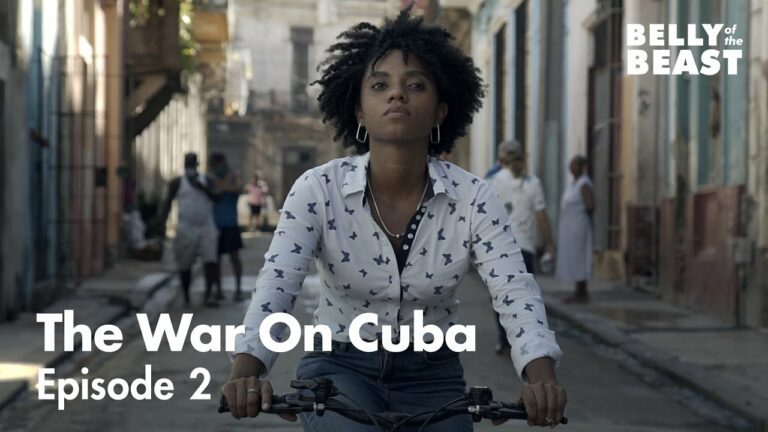
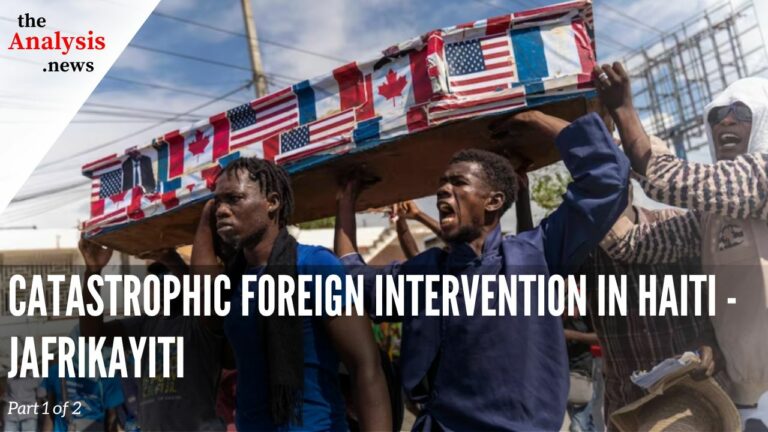
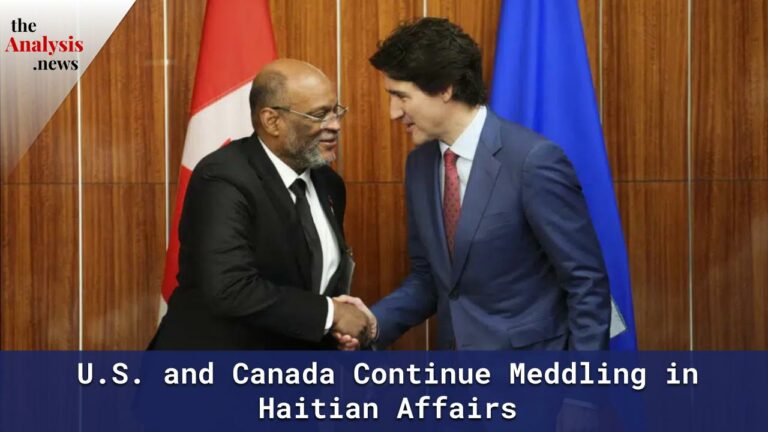
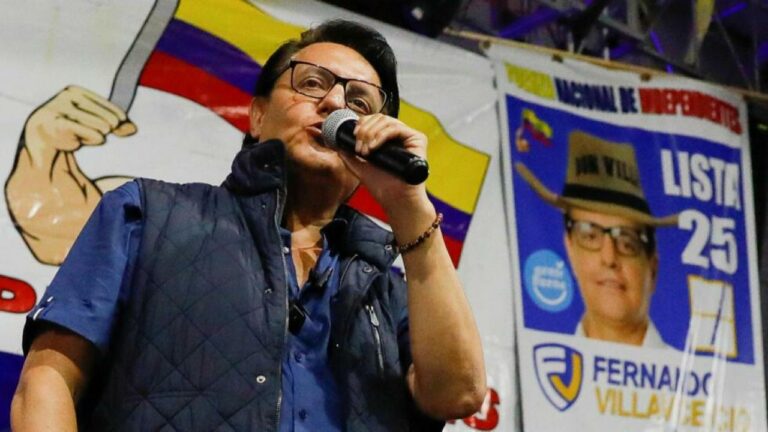
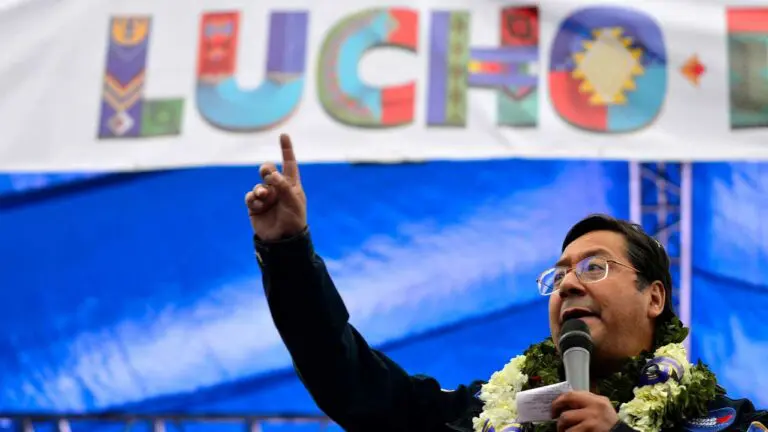

Paul,
Very good and very much needed. I suggest the next (and final) threat is the corporate for-profit takeover of post-secondary education, first by imposing the “business mod-el” on financial stressed institution and then by ‘outsourc-ing’ and privatization. This is already well underway and, if it succeeds, will give Wall-Street irreversible control of our intellectual and cultural life.
gph